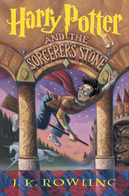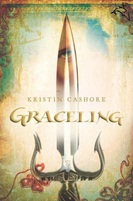Fantastical Infodumps and Where Not To Find Them
No one would argue that fantasy could be done without worldbuilding, it is as essential to the fantasy genre as happily ever after is to romance. But what is the best way to transfer knowledge of the fantastical world to the reader? Fantasy author Elizabeth Bear states that “oft-reviled, the infodump used artfully is nevertheless one of the best means of delivering information” (Bear 199). Yet personally, the mere hint of an infodump leaves me saying “screw the dragon ride” and using my own two feet to run from Fantasyland as fast as I can. Was this the determining factor for me in my love-hate relationship with fantasy, how artfully infodumps are used?
As I was never able to finish J.R.R. Tolkien's The Lord of the Rings (yeah, it's a map thing), I decide to examine the second most popular fantasy novel of all time, J.K. Rowling's Harry Potter and the Sorcerer's Stone, the story of an orphaned boy who learns he is a wizard.
Rowling artfully avoids any worldbuilding infodumps in her first chapter, choosing instead to provide back story on the Dursley family. Delivered in a fashion similar to the work of Roald Dahl, this serves two purposes. It distracts from the magical shimmers of the wizarding world already being revealed - “None of them noticed a large, tawny owl flutter past the window” (Rowling 2) – and also puts the reader in a position where to disbelieve in the wizarding world means siding with Team Dursley. Anyone up for membership in the most boring tie club? Anyone? Anyone?
Rowling repeats this trick in her second chapter, using a short series of three events from Harry's past to show that, well, there's something about Harry. His hair mysteriously grows back after a bad haircut, a revolting hand-me-down sweater somehow shrinks in the laundry, and he manages to jump onto the roof at school when being bullied. Additionally, “[S]ometimes he thought (or maybe hoped) that strangers in the street seemed to know him” (Rowling 30). This could be a massive infodump of observations about these strangers, who are of course wizards, yet Rowling refrains from explaining, merely noting that the people have odd fashion tastes.
When mysterious letters begin appearing for Harry and follow him and the Dursleys even out to an island in the middle of a stormy sea, Rowling still does not submit to an info-dump. Instead, she reveals glimmers of Harry's past through an argument the giant Hagrid has with the Dursleys, raising more questions than she answers throughout two pages of escalating fighting that builds to this:
“STOP! I FORBID YOU!” yelled Uncle Vernon in panic.
Aunt Petunia gave a gasp of horror.
“Ah, go boil yer heads, both of yeh,” said Hagrid. “Harry – yer a wizard.” (Rowling 50)
Though some of Rowling's other writing in this excerpt could be questioned, her suppression of info-dumping is admirable. Harry, you're a wizard.
While it does fall on Hagrid to explain a bit of Harry's past, Rowling again avoids an info-dump, focusing the story on Voldemort over the magical world, raising as many new questions as she answers old, and skillfully weaving all of this into dialogue with Hagrid:
[Hagrid sat down, stared into the fire for a few seconds, and then said, “It begins, I suppose, with – with a person called – but it's incredible yeh don't know his name, everyone in our world knows–”
“Who?” [Harry answering]
“Well – I don't like saying the name if I can help it. No one does.”
“Why not?”
“Gulpin' gargoyles, Harry, people are still scared. Blimey, this is difficult. See there was this wizard who went...bad. As bad as you could go. Worse. Worse than worse. His name was...”
Hagrid gulped, but no words came out.
“Could you write it down?” Harry suggested.
“Nah – can't spell it...” (Rowling 54)
Rowling continues this scene to basically establish that no one knows why Voldemort went to Harry's house or why Harry survived or what exactly happened to Voldemort, including if he is even really gone. A far cry from an explanation of the magical world, this is essentially the opposite of an infodump. Rowling uses a similar reverse infodump in a later scene where Harry meets Draco Malfoy as the two are getting measured for their school robes:
“Have you got your own broom?” the boy went on.
“No,” said Harry.
“Play Quidditch at all?”
“No,” Harry said again, wondering what on earth Quidditch could be.
“I do – Father says it's a crime if I'm not picked to play for my House, and I must say, I agree. Know what House you'll be in yet?”
“No,” said Harry, feeling more stupid by the minute.
“Well, no one really knows until they get there, do they, but I know I'll be in Slytherin, all our family have been – imagine being in Hufflepuff, I think I'd leave, wouldn't you?” (Rowling 77)
Instead of telling us about the magical world, Rowling lets us explore it with Harry as he buys his school supplies in Diagon Alley and magnifies the extent of it through the questions raised by her reverse infodumps.
In contrast, here is an excerpt from the second chapter of Graceling:
The kings of Wester, Nander, and Estill – they were the source of most of the trouble. They were cast from the same hotheaded mold, all ambitious, all envious. All thoughtless and heartless and inconstant. King Birn of Wester and King Drowden of Nander might form an alliance and pummel Estill's army on the northern borders, but Wester and Nander could never work together for long. Suddenly one would offend the other, and Wester and Nander would become enemies again, and Estill would join Nander to pound Wester. (Cashore 18)
This infodump tells about the world but doesn't develop character, advance the plot, or raise questions for me as a reader, apart from how will I keep all these kings straight?
Rowling does use one small paragraph that could be argued as an infodump at Ollivander's wand shop, where Mr. Ollivander says:
“Every Ollivander wand has a core of a powerful magical substance, Mr. Potter. We use unicorn hairs, phoenix tail feathers, and the heartstrings of dragons. No two Ollivander wands are the same, just as no two unicorns, dragons, or phoenixes are quite the same. And of course, you will never get such good results with another wizard's wand.” (Rowling 84)
With Mr. Ollivander's amazing memory about every wand he's ever sold, however, even this paragraph seems more about salesmanship than worldbuilding. A similar very short paragraph much later in the novel allows Harry to quote off some Quidditch trivia but is unnoticeable to the casual observer as Harry was reading a school library book on the subject, a natural activity for a student at any school.
Mostly, Rowling writes confidently about her world. No explaining that ghosts exist, they simply stream through the wall. She allows magical events to unfold as any other event, such as the song of the Sorting Hat: “A rip near the brim opened wide like a mouth – and the hat began to sing” (Rowling 117). No explanation about how this occurs also conveniently prevents questioning of the magic involved.
It is not until halfway through the novel when Harry begins classes at Hogwarts that Rowling succumbs to a couple of pages of infodump, describing the tricky staircases at Hogwarts, the characters of Peeves the poltergeist and Filch the caretaker, and the various classes required of first years. And apart from the first couple of paragraphs, this is not so much worldbuilding as a summary of Harry's first few days of class. Judging by the length and popularity of Rowling's ensuing books in the series, this summary could have been eliminated entirely and given over to active scenes following Harry through those first classes just as the reader has followed him thus far on his journey into the magical world.
Rowling's novel stands apart from many fantasy novels in the fact that her main character, Harry, is, like the reader, new to her world. This begs the question as to whether complete exclusion of infodumps would work for all fantasy novels. For example, the scene in which Quidditch captain Oliver Wood explains the game to Harry would not have been natural nor believable if Harry were not new to the magical world himself. But in avoiding the infodumps stereotypical of her genre, Rowling merged fantasy and reality and this may be what brought many new fans to the fantasy fold. While infodumps continue in many fantasy novels, mine won't have a map.
Works Cited
Bear, Elizabeth. “Tactics of Wordbuilding.” Writer's Workshop of Science Fiction & Fantasy. Ed. Michael Knost. Lexington: Seventh Star Press, 2013. 193-200. Print.
Cashore, Kristin. Graceling. New York: Graphia, 2008. Print.
Rowling, J.K. Harry Potter and the Sorcerer's Stone. New York: Scholastic, 1997. Print.



 RSS Feed
RSS Feed